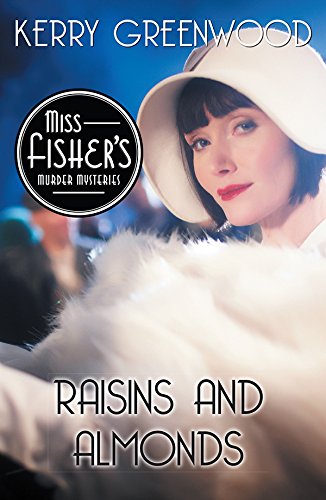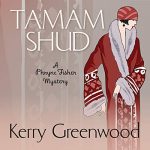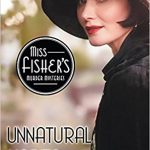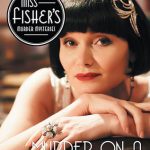 Raisins and Almonds (Phryne Fisher Mystery #9) by Kerry Greenwood
Raisins and Almonds (Phryne Fisher Mystery #9) by Kerry Greenwood Formats available: hardcover, paperback, large print, ebook, audiobook
Series: Phryne Fisher #9
Pages: 217
Published by Poisoned Pen Press on June 6th 2017
Purchasing Info: Author's Website, Publisher's Website, Amazon, Barnes & Noble, Kobo, Bookshop.org
Goodreads
Phryne Fisher loves dancing, especially with gorgeous young Simon Abrahams. But Phryne s contentment at the Jewish Young People s Society Dance is cut short when Simon s father asks her to investigate the strange death of a devout young student in Miss Sylvia Lee s East Market bookshop. Miss Lee has been arrested for the murder, and Phryne believes that she is a very unlikely killer. Investigation leads her into the exotic world of Yiddish, refugees, rabbis, kosher dinners, Kadimah, strange alchemical symbols, and chicken soup. With help from the old faithfuls Bert and Cec, her taxi driver friends; her devoted companion Dot; and Detective Inspector Call me Jack Robinson, Phryne picks her way through the mystery. She soon finds herself at the heart of a situation far graver and more political than she at first appreciates. And all for the price of a song ."
My Review:
The best fictional detectives are nearly always outsiders. As outsiders they have no vested interest in any or all of the potential victims, nor are they predisposed to protect or defend any of the potential suspects merely because of some connection, perceived or otherwise. Finally, they tend to make fewer or no assumptions based on prior knowledge, because as outsiders they have little or none.
Phryne Fisher is always somewhat of an outsider. Her early years were spent in Melbourne’s slums, her family destitute and with never enough to eat. But she’s not poor any longer. A lot of young men died, and suddenly her father inherited a dukedom in England and the money to go with it. She and her family were whisked away to England, to a life of luxury. But she never forgot.
Even though she learned to pretend to be “to the manor born”, she is all too aware that she was not. While she can walk in both worlds easily, she is not quite a member of either.
In Raisins and Almonds, she is even further an outsider, as the investigation of this particular crime requires that Phryne insert herself into Melbourne’s Jewish community, at least as much as a shiksa (a rather pejorative Yiddish word for a female non-Jew) can insert herself. She begins by knowing only one person, her current lover, Simon Abrahams. And she is aware from the very beginning that she is only borrowing him, and must return him, possibly heartbroken but otherwise unharmed, to his people and his heritage. And she’s fine with that, even though Simon is not.
But Simon’s father is more than willing to make use of the female detective temporarily in their midst, when one of his tenants in the Eastern Market is accused of a murder she so obviously did not commit. Especially because the man who was most definitely murdered was also a member of the Jewish community. Miss Lee the bookshop proprietor may not have committed the deed, but somebody surely did.
And the elder Mr. Abrahams wants that murderer found, quickly, quietly and correctly, before whispers about the Jews rise to the level of violence that all the members of the community left behind in whatever European country they once called home.
While those fears feel unfounded both to Phryne and to the Australian-born generation of the Jewish community, it is also impossible to deny that anti-Semitism is definitely on the rise in Europe as well as in post Revolutionary Russia. The recent publication of Mein Kampf has caused many to turn worried eyes towards Germany, while the younger and more passionate among them seek adventure and purpose in Zionism with its promise of a homeland in Palestine.
Any or all of these tensions could be the cause of murder. But the motives of this particular murder turn out to be much, much more primitive. Greed is universal. So are envy and jealousy. And no one ever wants to see the snake in their own private garden.
Escape Rating B+: Phryne is always the consummate outsider. At the same time, one of the characteristics that seems singular to Phryne is that she seems to be immune to the prejudices of her day. She takes everyone as she finds them, and does not seem to enter into any conversation or association with any preconceived notions, at least not any notions based on race, class, gender identity, sexual preference or religion. So far in the book series, Phryne has demonstrated that she carries none of the anti-gay, anti-Asian and now anti-Semitic views that were common in the 1920s. And as a reader, I can’t help but wonder if this is a reflection of the author’s times rather than Phryne’s.
Which doesn’t keep me from being appreciative. One of the difficulties of reading what are now historical mysteries but were contemporaneous in their day is the amount of casual racism and sexism that often imbues the pages.
There was plenty of overt anti-Semitism in the 1920s. And indeed well into my own lifetime. While there seems to be a relatively recent resurgence of open and vitriolic anti-Semitism, it never completely goes away – it just goes underground. There have been times in my life where it has been more subtle, and also times when it has been less so. But the dark underbelly of human nature seems ineradicable, and the impulse to hate others, and oftentimes it has been the Jews, never disappears completely.
Which meant I understood completely the desire of the older generation of the Abrahams family to find a just solution to the crime as quickly as possible. Too much attention from the police or especially from the press would be seen as inviting just the kind of trouble that they had all left behind in Europe. Not that there weren’t occasionally violent impulses and certainly casual anti-Semitism in Australia, but so far, those impulses had not broken out in pogroms and outright persecutions.
Unlike many detective stories, Phryne’s cases often involve multiple perpetrators. This always serves to increase the number of red herrings and confuse the proceedings mightily. These stories are also not traditional stories in the sense that we don’t always see all the clues that Phryne sees, or at least it seems that way, even at the end.
 This was a case where the differing motives for the various sets of crimes practically tripped each other up. There was murder, there were multiple attempts at robbery, but underlying that whole mess was a quite deceptive morass of espionage. All of which kept me, and everyone else involved in the case, guessing until the very end.
This was a case where the differing motives for the various sets of crimes practically tripped each other up. There was murder, there were multiple attempts at robbery, but underlying that whole mess was a quite deceptive morass of espionage. All of which kept me, and everyone else involved in the case, guessing until the very end.
Raisins and Almonds was not my first trip to Phryne Fisher’s 1920s Melbourne (I began with Cocaine Blues and so should you, not because you need to read this series all the way through from the beginning but because they are all good fun), and I know it will not be my last.






















I just bought Cocaine Blues, so it is good to see reviews of her other books. Thanks!